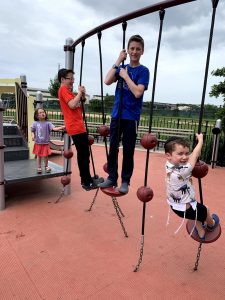Mommy Summer Camp
Ita Yankovich
I didn’t earn any tips, and I didn’t get the best counselor award, but I know I was the best – and all my campers agree.
Ok, so there were only two of them, and they were my kids, but we all concur that the last two summers at Yankovich Mommy Camp were the best ever!
When COVID-19 hit and camps were shut down, my children and I camped out in good old Brooklyn and found that we actually enjoyed the experience. And so, last summer, when camps reopened for business, I chose to keep my kids home again instead. My WhatsApp blew up as mothers posted: “Are you crazy?!” “How will you keep them occupied? “How will you get any work done?”
Why did I do it? Why did I commit to weeks of endless water balloon fights, playdough playdates, and bike rides around the block? Because as so many “administrators” of mommy camp will tell you, there’s nothing quite like it.
A Less-Stressed Summer
In Camp Yankovich, our days were productive but chilled. I took my kids to their annual checkups without the time constraints that exist during the school year. They weren’t forced to play baseball under a blazing sun if they didn’t want to. They didn’t have to fight to get the ball or try to listen to parasha stories while other kids disrupted. I was more relaxed and so were the kids.
There are many other moms who keep their kids home for the summer who, like me, cherish the memories we create that no camp can match.
Sarit Kaplan, is a Midwood mother of five boys and a girl. In addition to running her home she helps run her husband’s plumbing business and assists women with lactation difficulties.
“Nothing against camps,” explains Sarit, “but the idea of having my children taken care of by young counselors makes me uneasy. At home, the counselor is Mommy. Mommy gives you lunch. Mommy takes you to bathroom. Mommy is there to break up a fight.”
Despite the number of responsibilities she must juggle, Sarit says that keeping her kids home helps calm her nerves.
Elisheva Bielinki lives in Tom’s River, New Jersey. She says that summers at “mommy camp” with her five children, who range in age from seven months to 18 years, are priceless. Elisheva isn’t currently employed, but in the past, she worked from home as a seamstress.
“In the summers, I usually did my work in the early mornings and late at night to free my days for time with the kids,” Elisheva says. “The money we saved was an added bonus, but never a determining factor for us.”
Creating a Schedule
Some kids thrive on structure while need their freedom. In our home, I’ve found that a mix of free time and structure works best. At the start of the first summer, I printed out a calendar and planned each day in 30-miunute increments. By the second year, I realized that we didn’t need it. Most of the time, we just winged it. I loved that our days were not dictated by a list.
Our mornings consisted of breakfast, davening, downtime, and learning time. After lunch, we’d head outdoors. Most days were spent at our wonderful Marine Park, playing in the sprinklers, tossing a football around the field, or riding our bikes. We visited so often that the Mr. Softee man whose truck was parked at the entrance would occasionally offer us free ice cream. In inclement weather, or for a change of scenery, we took the bus (or walked!) to Kings Plaza Dollar Tree to buy school supplies, clothing, or small trinkets. Even a trip to the pizza store broke up the day for us. Our afternoons concluded with dinner, play time, and more learning. They were allowed one hour of screen time in the evening, after which they’d shoot some hoops or ride their bikes. There were times when they were responsible for keeping themselves occupied. I did not feel that it was my job to designate every hour with an activity.
Sarit’s “mommy camp” evolves every summer. “We don’t run on a rigid schedule,” she says. “It‘s more decide as we go. We play it by ear.” Their itinerary includes visiting different parks every week, going to the beach, checking out books at the Brooklyn Public Library, splashing around in the backyard sprinklers, and visiting Bubby’s house.
A typical day for Sarit’s kids consists of breakfast, davening, learning, swimming, playing with Legos, and then lunch. After lunch, there is outdoor play with chalk, bike riding, and roller blading. Sarit’s kids love going to nearby parks, especially Flatlands Park. Manhattan Beach is another favorite. “We spend hours at the beach,” she says. “My kids love collecting shells and seaweed.” One thing that is always consistent is the evening routine. Dinner, baths, and bedtime are set at specific times each day.


Elisheva’s itinerary is similar. She allows her kids to sleep in and enjoy a late breakfast followed by swimming or a trip. Many of the trips rival those in camp: bowling, water parks, amusement parks, trampoline parks, zoos, aquariums, and ferry and boat trips. Her family discusses all the activities and trips they would like to do before the summer begins.
“Our trips and activities are usually based on their list,” Elisheva says. “After all, ‘mommy camp’ is all about the kids! If something doesn’t work out the way we planned it, the kids have to learn to accept that even though it’s upsetting.”
Juggling Camp and Work
I worked remotely for the last two summers, but this required a juggling act on my part. I would often power up my laptop and bring it along to the park so I could work on spreadsheets while my boys frolicked. Participating in Zoom meetings with the kids in the background was challenging, nor did it help when my little one told a VIP client to call back later as I was busy making schnitzel. But most days it was manageable, and I worked in between activities and in the evenings.
To keep them busy one day when I had a deadline, I created a scavenger hunt for them with about 20 clues scattered around the house. This not only was intellectually stimulating, as my clues involved critical thinking, but it also fostered a great bonding experience since they had to work together towards an end goal. This filled up about three to four hours of time for me to focus on my work. They were thrilled with the prize at the end of the hunt: a board game for the two of them to enjoy.
Sarit says that keeping kids home while you work is not for everyone. “You have to be the type who enjoys being an active parent,” she explains. “You also can’t have the expectation of getting all your work done! And don’t forget the food. You will be spending a lot of time in the kitchen cooking multiple meals a day.”


There are many challenges involved in running a home business and being there for everyone all the time. One particular problem Sarit faced was how to entertain her kids of various ages and interests. To some degree, she was able to solve the problem by buying a pool. “They splashed in it every day, rain or shine,” she says. In fact, her two older sons who did attend camp, admitted that they prefer their backyard pool to their camp’s Olympic-sized one.
Sarit, Elisheva, and I agree that sometimes to have the right balance of work and play, we do give in to electronics.
“Yes, my kids used screen time,” Sarit admits, “not excessively, though. It was restricted and limited.”
As a reward for homework and a way to wind down the day, I let my boys have one hour of screen time. This meant watching an approved show, listening or watching Jewish music videos, or allowing them to surf the web (with me in the room). My kids acquired so much knowledge by researching topics they wanted to learn more about – such as ice whirlpool formations, hurricanes, rare coins, and anything on animals. I was able to use this time to work.
Sharpening Skills
My kids accompanied me to the supermarket, pharmacy, and on mass transit to various appointments. They got lessons on nutrition, cooking, budgeting, time management, and cleaning. One of my kids took a public speaking course, while the other had daily ABA sessions. If a child needed extra help in reading, fractions, or Rashi, I would devote time to review it. We honed in on penmanship, kriah, and writing skills. I “hired” my older son to teach my younger son Gemara. My kids knew that if I was busy, they had to prepare their own breakfast and lunch, choose their clothing for the day, and pack their backpacks. But my favorite was that they learned how to be a better sibling. All this time spend together forced them to learn how to compromise, be supportive, and communicate better.
Sarit says that her kids’ strong bond with one another made it possible for the older siblings to teach the younger ones to ride a bike during the summer.
When the Elisheva’s family moved to Tom’s River, their new home came equipped with an in-ground pool, which over the summer allowed them to perfect their swimming skills. By the end of the summer, Elisheva’s son, who had been learning to put his head underwater, was able to dive headfirst into the deep end. Daily, unlimited exposure to the pool with plenty of room to roam without other kids getting in the way helped him master skills that may otherwise have taken years.
Find a Buddy
There are so many ways kids in “mommy camp” can socialize.
For starters, I found other kids who were also home for the summer, and we arranged occasional meet ups. My kids would call their friends, classmates, and relatives on the phone weekly or have Zoom meetings. My kids met other kids at the park and began forming casual friendships. They also got better acquainted with neighbors, both young and old.
Elisheva believes that “mommy camp” is a great opportunity to get together with other people who are home. “I often plan things with a friend whose children were similar ages. My kids invite friends to swim with them in our pool, but if no one else is available, the kids end up enjoying their siblings’ company, “ she says.
“My kids are typical kids” Sarit says laughingly. “Of course, they argue. Sure, they fight; It’s reality! But in the end, nobody complains about spending too much time with each other. They’ll all grow up, they’ll all spread their wings, and they’ll all eventually become independent.”
Next Year in…
When will mommy camp close its doors? Sarit and Elisheva do not have an end date. For now, this arrangement works for their families, and they intend to continue making magical memories summer after summer.
This year, I enrolled my boys in camp because I have returned to the office and can no longer work remotely. When the bus pulls away, I will be sad. I’m hopeful that my boys will have a great time at camp, but I long to recapture those summer day where we bonded over random walks in the neighborhood. I will miss the sound of my sons engaged in learning. Most of all, I will cherish the image of them walking arm in arm as they converse along the tree-lined path of Marine Park.
I suppose that if they don’t like camp, next summer we can re-register for Yankovich Mommy Camp!
I’m Booored!
With these quick, easy, and free summer home camp ideas, your kids won’t have time to whine about nothing to do.
Make a watermelon volcano
Fill the cavity of a whole watermelon with baking soda and vinegar and watch it explode!
Create cool origami figurines.
You can find books on this at the library or look online for ideas.
Write your own Mad Libs.
Visit your local fire or police station.
Bring them homemade treats as a show of gratitude!
Make your own popsicles.
Attend a free children’s workshop at Home Depot or Lowes.
Write to a pen pal.
Freeze objects in ice and then have fun breaking them free.
Create your own coloring book comic and trade with your friends and siblings.
Make a marble maze using household items.
Write and produce a family play.
Take photos, print them, and arrange them in a scrapbook.
You must be logged in to post a comment.